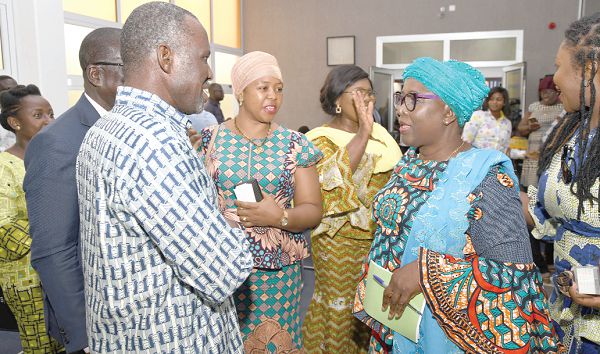
Local Govt Ministry outlines activities to journalists in Accra
The Ministry of Local Government and Rural Development has developed a digital platform to simplify the issuance of business operating permits (BOPs) in all the 29 districts in the Greater Accra Region.
The automation is aimed at enhancing the processing of permits and also improving the ease of doing business in the country.
The Minister of Local Government and Rural Development, Hajia Alima Mahama, who announced this in Accra yesterday, said the project, which was on a pilot basis, would be replicated in other parts of the country based on its success.
Addressing the media when her ministry took its turn at the ‘Meet the Press’ series, Hajia Mahama said a software had also been developed for the issuance of construction permits at the local assemblies.
“Additionally, a construction permit software has been developed for the Accra Metropolitan Assembly (AMA) and the Tema Metropolitan Assembly (TMA), under the Business Enabling Environment Project,” she announced.
She explained that at the AMA, the software had already gone live, with full access to users such as developers, architects, surveyors and planners, while at the TMA the Local Area Network and wireless network had been installed and configured to be completed this quarter.
Other places where the software would be introduced included the Tema West, Ayawaso West, Ablekuma West, Krowor and Adentan Municipal assemblies, she added.
Common Fund
On the District Assemblies Common Fund (DACF), the minister said the government, from 2016 to 2018, significantly increased net transfers to the metropolitan, municipal and district assemblies (MMDAs).
She said in 2017, GH¢663.18 million was transferred to the MMDAs, as against GH¢461.25 million in 2016, representing a 43.78 per cent increase, adding that total net transfers to the MMDAs in 2018 amounted to GH¢863.5 million.
Hajia Mahama said the transfers had resulted in the provision of over 1,200 sub-projects, including educational infrastructure, health, water and sanitation facilities at the local level across the country.
She gave the breakdown of the project categories as 413 roads, 329 educational facilities, 115 health infrastructure, 199 water and sanitation infrastructure, 21 economic/market projects and five utilities, among others.
IGF mobilisation
Hajia Mahama also highlighted measures that had been put in place to ensure that the MMDAs improved on their internally generated fund (IGF) mobilisation and said the MMDAs’ fee-fixing guidelines were reviewed and issued in 2017, with the mechanism resulting in many MMDAs identifying new revenue items which hitherto were not on their books.
“These revenue mobilisation interventions have resulted in an improvement in the IGF of MMDAs. IGF increased by three per cent between 2016 and 2017 and 18 per cent between 2017 and 2018.
The implementation of the pragmatic initiatives also increased IGF as a share of the MMDAs’ total revenue from 18 per cent between 2013 and 2016 to 23.51 per cent from 2017 to 2018,” she added.
Election of MMDCEs
The Local Government Minister announced that the government had developed a national campaign strategy to create awareness of the referendum on the election of metropolitan, municipal and district chief executives (MMDCEs), which would be conducted alongside the district level elections in December this year.
“The road map on the election of MMDCEs has been designed to be implemented in four phases: the pre-referendum phase, the referendum phase, the post referendum phase and the change management and capacity-building phase,” she explained.
Last Tuesday, the government laid before Parliament an amendment bill on the appointment of MMDCEs after the Cabinet had approved it.
Local governance system
Ghana has implemented the decentralisation and local governance system since 1988.
Hajia Mahama said although significant progress had been made in the local governance system, there were a few grey areas that required improvement for participatory governance and local democracy to be deepened.
“One of such grey areas is the need to popularly elect MMDCEs on partisan basis to be in tandem with the mode of electing national level leaders,” she stated.
She said as part of the process, the ministry had conducted a series of stakeholder sensitisation and consultations in all regions and mentioned some of the groups that participated in the consultations as the Parliamentary Select Committee on Local Government, the National Commission for Civic Education (NCCE), the Electoral Commission (EC), the National House of Chiefs, political parties, the Christian Council of Ghana, the Federation of Muslim Councils in Ghana, as well as professional and civil society groups.
Rural development policy
Hajia Mahama also touched on a Rural Development Policy developed by the government which would serve as a guideline for coordinated service delivery and investment in rural communities.
She said the policy sought to modernise agriculture for rural growth and development, provide quality socio-economic infrastructure and services in a decent and secure environment, as well as maximise the potential of rural areas towards rural enterprises development and industrialisation.
